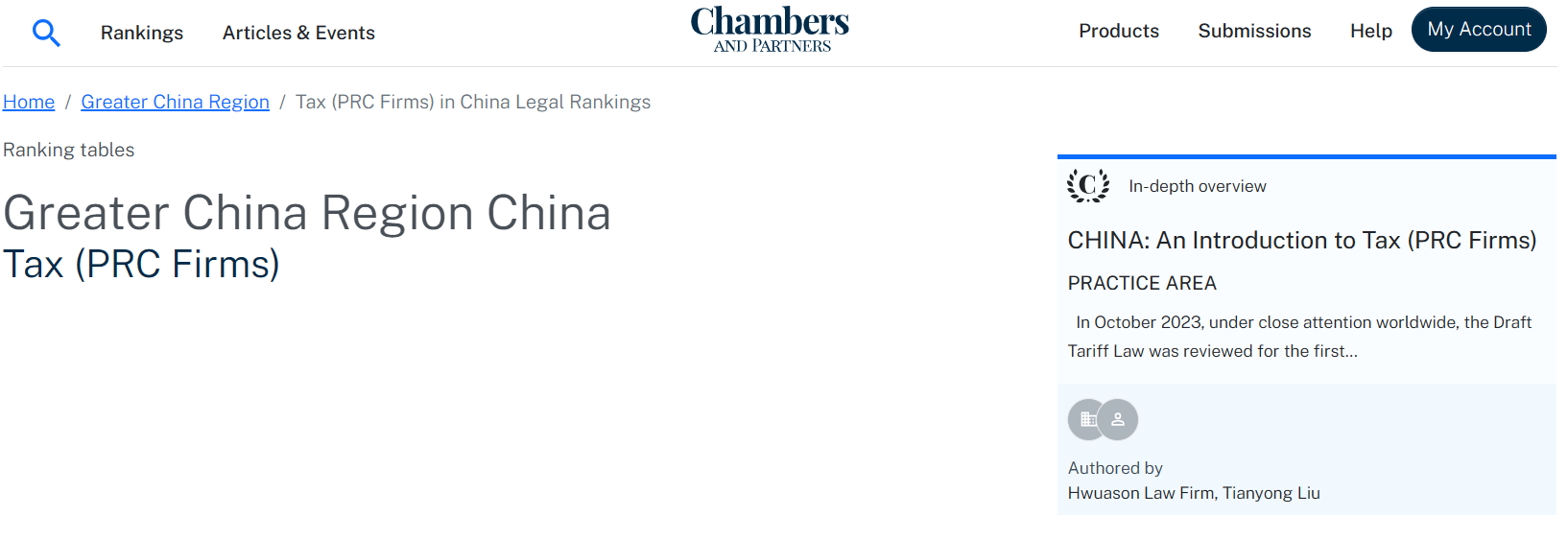2024年1月18日,全球权威法律评级机构钱伯斯(Chambers and Partners)发布了《2024钱伯斯大中华区指南》,华税律师事务所主任刘天永律师荣登中国税法领域顶尖律师榜单第一级别(Band 1)。刘天永律师自2010年以来已连续十余年上榜钱伯斯亚太法律指南和钱伯斯大中华区指南的中国税法领域顶尖律师榜单。

今年,刘天永律师再度接受钱伯斯的独家邀请,撰写了《2024钱伯斯大中华区指南——中国税法概览》一文,收录在2024年度钱伯斯大中华区指南。文章的中英文版转载如下:

2024中国税法概览
关税法草案问世
2023年10月,备受国内外瞩目的关税法草案由全国人大常委会进行了第一次审议,并于2023年12月29日向社会公开征求意见。关税法草案立足于推进高水平对外开放,兼顾维护主权利益和促进对外贸易的宗旨,强化国际条约协定优惠税率的优先地位,增设对等原则反制贸易保护主义和单边主义,对现行进出口关税条例的具体规则作出了一系列重大的调整和变化。
与现行进出口关税条例相比,关税法草案最为明显的改革是征管程序及相关规则。草案摒弃了海关事先审查税额的制度,确立了纳税人自主申报缴税、海关事后确认调整的程序规则。在这一新的程序设计下,海关不再填发税款缴款书,缴税期限也从自海关填发税款缴款书之日起15日内变更为自纳税申报完成之日起15日内,且允许纳税人在提供纳税担保后申请最长六个月延期缴纳税款。
为了强化海关的事后监管,关税法草案补充了针对欠缴税款的强制措施、阻止欠税人出境和强制执行规则,新增反避税条款,新增纳税人各类违法行为的责任条款,并对税款追征期进行了调整。对非因纳税人过错导致少缴漏缴税款的追征期从一年调整为三年,对因纳税人违反规定导致少缴漏缴税款的追征期从三年调整为无限期。与此同时,关税法草案更注重纳税人权利保障,取消了行政复议的缴税前置条件,将申请退还多缴税款的一年期限调整为三年,同时明确退税时加算银行同期存款利息。
按照中国三审定谳的立法规则,关税法草案将在2024年进入后续审议流程,并将在2027年之前完成制定。关税立法进程的加速推进必将对中国的外贸进出口市场乃至世界经济产生重要的影响。
税收立法进程
截至目前,中国现行18个税种已有12个税种制定了法律。除了前文提及的关税以外,增值税、消费税、城镇土地使用税、房产税、土地增值税的立法推进程度各有不同。
增值税法草案有望在2024年三审通过。2023年8月,全国人大常委会对增值税法草案进行了第二次审议。由于增值税在国家税收收入中所占比重较大,影响行业面广,社会各界对增值税法草案关注度高。目前,立法机关意见征集相对充分,增值税法草案二次审议稿相对成熟完善,有望在2024年完成第三次审议后通过。
消费税法草案能否在2024年提请首次审议有待观察。国务院曾于2021年计划将消费税法草案提请全国人大常委会审议但未能完成,随后在2022年和2023年的立法工作计划中均没有将消费税法草案列为提请审议的对象,仅纳入“预备提请”的计划中。近年来消费税的立法进展较为缓慢,究其原因或有以下三个方面:第一,消费税的中央与地方税源关系有待进一步优化,需要进一步统筹消费税征管与税源分享的关系;第二,现行消费税的征收环节类型复杂,实务中是否应当简并征税环节的争论较多;第三,消费税立法面临纳税人知情权保障、企业国际竞争力、弱化宏观调控灵活性等诸多问题的挑战。
房地产税立法进程趋缓。2023年9月,十四届全国人大常委会公布了2023年至2027年的五年立法规划,力争在2027年之前完成增值税、关税和消费税立法,但是并未把与房地产税相关的城镇土地使用税、房产税、土地增值税的法律草案纳入立法规划。可以看到,房地产税的立法进程明显放缓,在未来五年内难有突破性进展。
税收征管改革
2024年国内的减税降费政策将向投融资领域和高科技产业倾斜。财政部、国家税务总局等部门在前不久出台了一些新的税收优惠政策。例如,《财政部 税务总局关于继续实施企业、事业单位改制重组有关契税政策的公告》(2023年第49号)和《财政部 税务总局关于继续实施企业改制重组有关土地增值税政策的公告》(2023年第51号)规定,截至2027年12月31日前,符合一定条件的企业因并购重组发生的房地产交易免征契税和土地增值税。《财政部 税务总局 国家发展改革委 工业和信息化部关于提高集成电路和工业母机企业研发费用加计扣除比例的公告》(2023年第44号)规定,自2023年1月1日至2027年12月31日,集成电路企业和工业母机企业开展研发活动中实际发生的需计入当期损益的研发费用,可按照实际发生额的220%在税前扣除;形成无形资产的,可按照无形资产成本的220%在税前摊销。此外,一系列普惠性的税收优惠政策将在2024年延续,惠及数量庞大的国内中小企业。
2024年中国将深化智慧税务的改革进程。税收大数据的运用打通了税务、银行、工信、市监、海关等多部门的信息数据。数字化电子发票全面推广增强了税务机关的发票稽核比对能力,能够更为精准判断虚开发票的违法行为,提升监管效率。以金税四期为核心的智慧税务系统可以总结纳税人个性化涉税信息,绘制“纳税人画像”,做到“一户一档”,并对纳税人的异常经营活动准确预警,及时排查和处置税务风险。税务机关进一步依托数字化、信息化手段实施精准监管,在极大便利企业的同时,也给企业提出了更高的税务合规要求。
2024年企业涉税刑事责任风险依然严峻。2021年10月,最高人民检察院、公安部、国家税务总局、海关总署、国家外汇管理局、央行联合启动打击虚开骗税违法犯罪工作机制。2023年7月,最高人民法院加入这一工作机制,形成了全国七部门联合打击涉税违法犯罪工作的常态化形势。自2021年10月至2023年5月,全国税务司法部门累计检查涉嫌虚开骗税企业27万户,认定虚开发票1048.15万份,挽回出口退税损失117.8亿元。其中,2023年1月至5月累计检查涉嫌虚开骗税企业6.5万户,认定虚开发票184.62万份,挽回出口退税损失44.59亿元。常态化打击涉税违法犯罪工作机制在有效维护经济税收秩序、营造法治公平营商环境的同时,也使得更多的企业重视税务合规,积极防范涉税风险。
税务合规观察
随着近三年最高人民检察院、最高人民法院推行刑事诉讼合规机制改革,企业合规已在中国起步,成为法律服务市场中的“热搜词”。税务合规是企业合规的重要组成部分,在税收法律刚性不断增强、税收征管改革不断深化的影响下,受到的关注程度尤为突出。
税务合规的核心是防范和应对企业税务风险。近年来,企业税务风险呈现出类型化与行业化的明显特征,聚集在石化能源、医药、再生资源、大宗商贸、物流运输、灵活用工、外贸、投融资与高净值个人等行业和领域。企业的税务风险行为集中表现为虚开发票、骗取出口退税、滥用税务筹划、恶意逃避税等。
在过去的一年里,华税律师团队持续深耕于这些高税务风险行业的税务合规与税务争议解决法律市场,帮助了数十家企业建构税务合规管理机制、完满解决各类税务争议、妥善处置刑事责任风险,为维护纳税人合法权益、促进国家税收法治建设贡献个案力量。自2020年以来的每年年初,华税律师团队持续针对各年度高税务风险行业编写数万字的税务合规研究报告。每份报告围绕一个行业,洞察征管趋势,提示涉税风险,解析疑难复杂典型案例,分享案件办理成功经验,在税法服务市场中已经成为相关行业最为瞩目的开年重磅活动。今年1月,华税律师选取了十二个高税务风险行业,编写了各个行业的2024年度税务合规研究报告,并将陆续以直播形式发布,报告全文均收录在华税官方网站(www.huashui.com),希望能帮助更多国内企业实现税务合规,远离税务风险。
在新的一年里,相关重点行业领域的在华企业要关注涉税风险的变化趋势,既要妥善处置历史业务遗留风险,又要审慎应对新问题和新风险。企业要积极寻求国内税务律师的专业支持,通过建构企业内部的税务合规管理机制,强化企业日常经营管理的税务合规程度和重大经营决策的税务合规考量,确保企业能够提前预防风险,准确识别风险,妥善处置风险和解决涉税争议,实现安全增长和持续发展。
China's Tax Law Reforms 2024
Release of Draft Tariff Law
In October 2023, under close attention worldwide, the Draft Tariff Law was reviewed for the first time by the NPC Standing Committee, and was released on December 29th to the public for opinions. The Draft is based on promoting high-level opening-up, balances both sovereign right safeguarding and foreign trade promotion, strengthens the priority position of preferential tax rates in signed international treaty agreements, and adds the reciprocity principle provision to counter trade protectionism and unilateralism. Equally notable is that the Draft has made a series of significant adjustments and changes to PRC Regulations on Import and Export Duties.
Compared with the current PRC Regulations on Import and Export Duties, the most obvious reform of the Draft is the collection and management procedures and related rules. The Draft abandons the rule that customs pre-examine the tax amount, and establishes a new procedure: taxpayers shall first declare and pay taxes independently; afterwards, customs only confirm or adjust taxes. After declaration, customs will no longer issue tax payment bills; taxpayers shall pay within 15 days from the tax declaration completion date, no longer from the tax payment bill issue date. Moreover, the Draft allows taxpayers to apply for a maximum extension of six months for tax payment after providing a tax guarantee.
In order to strengthen customs' ex post supervision, the Draft adds rules of administrative compulsory measures and enforcements: preventing outstanding taxes departure; anti-tax avoidance; legal liabilities of taxpayers for various illegal actions; and extending the scheduled period of tax collection. If the consequence of not paying or paying less tax has not been caused by the taxpayer' s fault, customs are authorised to collect tax within three years, instead of one year. If the consequence is caused by the taxpayer's illegal actions, customs are authorised to collect tax without time limitation, instead of within three years. The Draft equally emphasises the protection of taxpayers' rights. For example, full tax payment, the condition before applying for administrative reconsideration, is no longer required. Taxpayers also have the right to apply for a refund of overpaid tax within three years, instead of one year, and interest at the bank deposit rate for the same period will additionally be refunded.
According to China legislation rules, the Draft Tariff Law will go through the subsequent review process in 2024, and will be adopted before 2027. Legislative progress is now speeding up, and it will cause significant impact to China's foreign trade and the world economy.
Progress of Other Tax Legislation
Up until now, 12 of China’s current 18 tax categories have enacted laws. In 2024, the legislative progress differs for value-added tax, consumption tax, land value-added tax, land use tax and house tax.
The Draft Value-Added Tax Law may be adopted in 2024. In August 2023, the Draft Value-Added Tax Law was reviewed, secondly, by the NPC Standing Committee. Value-added tax accounts for a significant proportion of national tax revenue and the legislation impacts on widespread industries, so the Draft attracts close attention in all circles. At present, the legislature has collected relatively sufficient numbers of opinions from the public, and the Draft for Second Deliberation is relatively mature and complete, so hopefully the Draft may be adopted in 2024.
It remains to be seen whether the Draft Consumption Tax Law will be submitted for initial review in 2024. In 2021, the State Council planned to submit the Draft for initial review, but it was not finally submitted. Subsequently, the Draft was not included as a “ready to submit” project in the 2022 and 2023 legislative work plans, but was listed only as a project “preparing to submit”. In recent years, the legislative progress of consumption tax has been relatively slow, mainly due to the following three reasons. First, the distribution of consumption tax sources between the central and the local needs further optimisation. Second, the Draft shows complex collection processes, causing numerous controversies. Third, the Draft fails to address many issues such as safeguarding taxpayers’ information rights, safeguarding the international competitiveness of enterprises, maintaining macroeconomic flexibility, and so on.
The legislative progress of Real Estate Tax is slowing down. In September 2023, the NPC Standing Committee announced the five-year legislative plan 2023–2027, striving to complete the legislation on value-added tax, tariff and consumption tax before 2027. However, the land value-added tax, land use tax and house tax are not included in the five-year plan. It shows that China real estate tax law legislation will not have any breakthrough progress during the next five years.
Tax Collection and Management Reforms
Tax reduction policies tilt towards investment and financing sectors and high-tech industries in 2024. For some examples, from 1 January 2024 to 31 December 2027, real estate transactions incurred by enterprises due to mergers and acquisitions are exempt from deed tax and land value-added tax. Where the R&D expenses that have actually been incurred by an integrated circuit enterprise or industrial machine tool enterprise when it conducts any R&D activity have not been included in the current profit and loss account as intangible assets, in addition to the deduction of the prescribed expenses, another 120% of the R&D expenses actually incurred shall be deductible before tax payment between 1 January 2023 and 31 December 2027. If the said expenses have been converted into intangible assets, such expenses may be amortised at the rate of 220% of the costs of the intangible assets before tax payment during the said period. Besides, a series of inclusive tax incentives policies will continue in 2024, benefiting a large number of domestic small and medium-sized enterprises.
In 2024, China will deepen the reform of smart taxation. The application of tax-related big data has connected tax information from multiple departments such as taxation, banking, IIT, MR and customs. E-invoicing reform is fully utilised, and the whole process of invoice issuance and use will be verified and monitored in real time, bringing about a transformation from the punishment of tax offences to accurate prevention in advance. The intelligent collection of “one legal person-based” and “one natural person-based” tax and fee information is basically realised by smart taxation. Data-driven tax administration not only brings segmented and precise supervision, but also brings higher requirements of tax compliance for enterprises.
Risks of tax-related criminal liability for enterprises remains severe in 2024. In October 2021, the Supreme Procuratorate, Public Security Ministry, State Taxation Administration, General Customs, State Foreign Exchange Administration and Central Bank jointly launched a system to crack down on tax crimes. In July 2023, the Supreme Court joined this system; thus, seven central departments now jointly crack down on tax-related offences and crimes. From October 2021 to May 2023, nationwide tax and judicial authorities had already inspected and accused 270,000 enterprises suspected of false issuance of invoices and of committing tax refund frauds, identified 10,481,500 false invoices, and saved CNY11.78 billion export tax refund losses. From January to May 2023, some 65,000 enterprises had been inspected and accused, 1,846,200 false invoices had been identified, and CNY4.459 billion export tax refund losses had been saved. This normalised system not only effectively maintains economic tax order and creates a legal and fair business environment, but also makes more enterprises attach importance to tax compliance and actively prevent tax risks.
Tax Compliance Market
Simultaneously, the Supreme Procuratorate and the Supreme Court over the past three years have continued implementing reform of the compliance mechanism for enterprises involved in criminal cases; the enterprise compliance market has commenced and developed in China, and has now become the “most-searched topic” in the legal services market. Tax compliance is an important component of enterprise compliance, and has received particularly prominent attention as a result of strengthened tax law rigidity and deepening tax system reform.
The core of tax compliance is to prevent and respond to tax risks. In recent years, tax risks have exhibited clear characteristics of typification and industrialisation, gathering in certain industries and fields such as energy, pharmaceuticals, renewable resources, bulk commerce, transportation, flexible employment, foreign trade, investment and financing, and high net worth individuals. Tax risk behaviours mainly include false issuance of invoices, tax refund frauds, abuse of tax planning and tax evasion.
In the new year, China enterprises in relevant key tax-risk industries should pay attention to the changing trends of tax risks: not only properly handle historical tax risks, but also prudently face new problems and risks. We strongly recommend that enterprises seek professional support from China tax lawyers to establish internal tax compliance management systems, ensure regular operating activities are compliant with tax law and major business decisions are inspected from a tax law rules perspective. To achieve secure and sustainable growth, tax risks must be prevented early, identified accurately and disposed of legally.









文章评论(0)